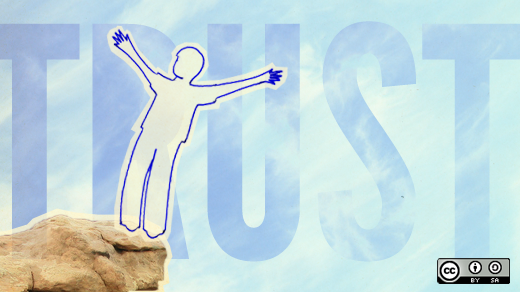A few weeks ago, I was having a discussion with a fellow manager on my team. This person reports to someone who reports to me, generally has a different set of concerns than I do, and therefore holds a unique perspective on the challenges we face. I'd been digressing on a hypothetical course of action when the manager interrupted me to say, "Excuse me, I just want to say that I'm not comfortable with the direction this is going in." I immediately stopped talking and thought about what I'd been saying. I tried to explain what I meant, to give more context, and to go at it from a different angle. The manager also shared some context and perspective, which helped me understand the discomfort.
Although the sudden declaration surprised me, I was thankful for it. It enabled us to talk through the issue and get to a point where we could continue to have a productive discussion.
Only much later, when reflecting on this moment, did I realize what a powerful feedback tool the manager had adopted. How many people would interrupt to share feelings that were interfering with the ability for us to continue a productive dialog?
I think the more common approach would probably be to shut down and withdraw from the dialog, continue harboring the negative feeling, and perhaps even letting it grow into resentment. That more typical reaction (which I know I've had) can lead to weeks or months of misalignment or misunderstanding, sacrificing productivity and creating a distrustful work environment.
This person gave me a great gift, raising my awareness of something I do that causes negative influence: sometimes speaking freely without taking into account the perspective and context of the people I'm speaking to.
We can learn to recognize the feelings bundled with our reactions: a sinking feeling in the gut, an increased heart rate, feeling flushed, an urge to quickly respond, to correct, or defend. What if, when sensing those triggers, we were able to simply share that they were there?
- "Your comments are making my pulse rise. I think I'm getting defensive. Can we explore that?"
- "What you are saying is making me feel like firing back with my version of the story. Instead of doing that, maybe we can discuss why I might be feeling that way?"
- "I'm sorry but your words are making me a little nervous—like maybe you don't think I should be responsible for this. Can we talk about what's behind that?"
In some ways, this would be quite challenging. It would require both recognizing your own feelings and understanding the triggers that can impact potential outcomes of discussions. That requires a lot of self awareness, which can take much practice and self reflection. And even after we've gotten better at the recognition part, sharing the feelings aloud would require being vulnerable: acknowledging your feelings and taking a risk with your emotions take courage.
Among the benefits of being vulnerable is building more trust with colleagues. In his 2012 book The Advantage, Patrick Lencioni describes trust as the foundation of a healthy organizational culture. Lencioni describes "vulnerability-based trust" as the result of team members getting "completely comfortable being transparent, honest, and naked with one another, where they say genuinely mean things like 'I screwed up,' 'I need help,' 'Your idea is better than mine,' 'I wish I could learn to do that as well as you do,' and even, 'I'm sorry.'" That kind of trust is essential, Lencioni explains, for enabling other elements of a healthy culture, like productive conflict.
I suspect most people don't work on teams that let them be completely honest and transparent—that let them expose their feelings in ways that make them vulnerable. Even if you work in an organization that is generally transparent or generally adheres to open organization principles, the dynamics of the team you work with on a daily basis may be different. If you don't have that trust, how do you get it?
From the colleague that shared their discomfort with me, I've learned that making yourself vulnerable in a discussion, calling out areas of concern that may have gone unacknowledged, openly raising questions that may have gone unasked, and sharing feelings that may have been hidden can trigger an evolution of the team's culture. That may seem pretty daunting to do on your own, and it is certainly risky (what if others don't reciprocate?). Another approach is to follow a model developed by someone like Patrick Lencioni, which provides some structure to get from where you are today to the high-trust place you want to be in the future.
In either case, getting started building trust and being more vulnerable means raising and discussing your feelings with your colleagues regularly. Doing so could be giving them one of the greatest gifts they've ever received.
Subscribe to our weekly newsletter to learn more about open organizations.






2 Comments